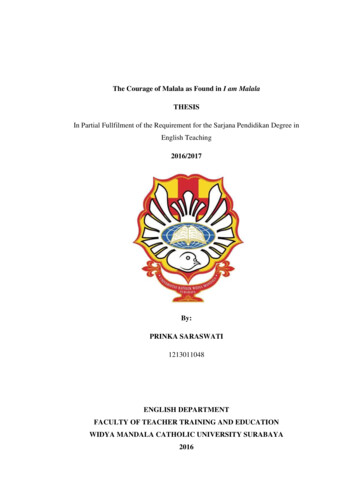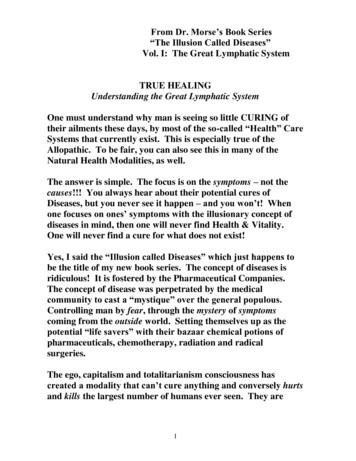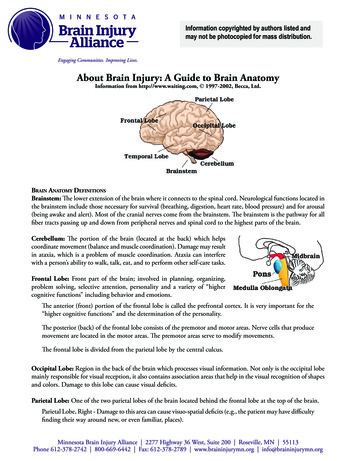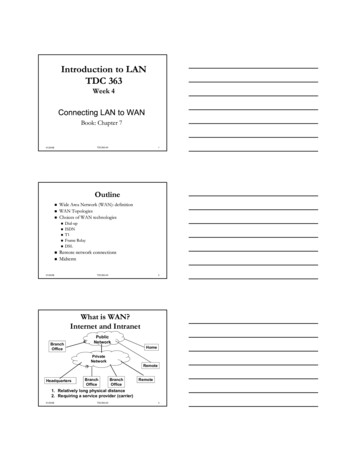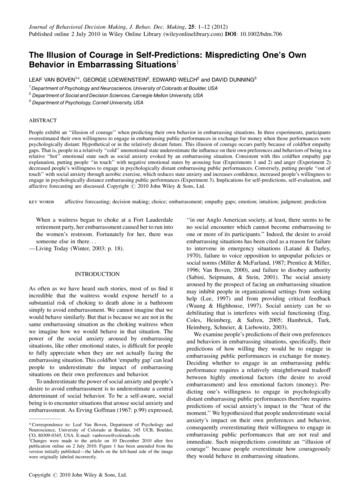
Transcription
Journal of Behavioral Decision Making, J. Behav. Dec. Making, 25: 1–12 (2012)Published online 2 July 2010 in Wiley Online Library (wileyonlinelibrary.com) DOI: 10.1002/bdm.706The Illusion of Courage in Self-Predictions: Mispredicting One’s OwnBehavior in Embarrassing SituationsyLEAF VAN BOVEN1*, GEORGE LOEWENSTEIN2, EDWARD WELCH2 and DAVID DUNNING31Department of Psychology and Neuroscience, University of Colorado at Boulder, USADepartment of Social and Decision Sciences, Carnegie Mellon University, USA3Department of Psychology, Cornell University, USA2ABSTRACTPeople exhibit an ‘‘illusion of courage’’ when predicting their own behavior in embarrassing situations. In three experiments, participantsoverestimated their own willingness to engage in embarrassing public performances in exchange for money when those performances werepsychologically distant: Hypothetical or in the relatively distant future. This illusion of courage occurs partly because of cold/hot empathygaps. That is, people in a relatively ‘‘cold’’ unemotional state underestimate the influence on their own preferences and behaviors of being in arelative ‘‘hot’’ emotional state such as social anxiety evoked by an embarrassing situation. Consistent with this cold/hot empathy gapexplanation, putting people ‘‘in touch’’ with negative emotional states by arousing fear (Experiments 1 and 2) and anger (Experiment 2)decreased people’s willingness to engage in psychologically distant embarrassing public performances. Conversely, putting people ‘‘out oftouch’’ with social anxiety through aerobic exercise, which reduces state anxiety and increases confidence, increased people’s willingness toengage in psychologically distance embarrassing public performances (Experiment 3). Implications for self-predictions, self-evaluation, andaffective forecasting are discussed. Copyright # 2010 John Wiley & Sons, Ltd.key wordsaffective forecasting; decision making; choice; embarrassment; empathy gaps; emotion; intuition; judgment; predictionWhen a waitress began to choke at a Fort Lauderdaleretirement party, her embarrassment caused her to run intothe women’s restroom. Fortunately for her, there wassomeone else in there. . .—Living Today (Winter, 2003: p. 18).INTRODUCTIONAs often as we have heard such stories, most of us find itincredible that the waitress would expose herself to asubstantial risk of choking to death alone in a bathroomsimply to avoid embarrassment. We cannot imagine that wewould behave similarly. But that is because we are not in thesame embarrassing situation as the choking waitress whenwe imagine how we would behave in that situation. Thepower of the social anxiety aroused by embarrassingsituations, like other emotional states, is difficult for peopleto fully appreciate when they are not actually facing theembarrassing situation. This cold/hot ‘empathy gap’ can leadpeople to underestimate the impact of embarrassingsituations on their own preferences and behavior.To underestimate the power of social anxiety and people’sdesire to avoid embarrassment is to underestimate a centraldeterminant of social behavior. To be a self-aware, socialbeing is to encounter situations that arouse social anxiety andembarrassment. As Erving Goffman (1967: p.99) expressed,* Correspondence to: Leaf Van Boven, Department of Psychology andNeuroscience, University of Colorado at Boulder, 345 UCB, Boulder,CO, 80309-0345, USA. E-mail: vanboven@colorado.eduyChanges were made to the article on 10 December 2010 after firstpublication online on 2 July 2010. Figure 1 has been amended from theversion initially published—the labels on the left-hand side of the imagewere originally labeled incorrectly.Copyright # 2010 John Wiley & Sons, Ltd.‘‘in our Anglo American society, at least, there seems to beno social encounter which cannot become embarrassing toone or more of its participants.’’ Indeed, the desire to avoidembarrassing situations has been cited as a reason for failureto intervene in emergency situations (Latané & Darley,1970), failure to voice opposition to unpopular policies orsocial norms (Miller & McFarland, 1987; Prentice & Miller,1996; Van Boven, 2000), and failure to disobey authority(Sabini, Seipmann, & Stein, 2001). The social anxietyaroused by the prospect of facing an embarrassing situationmay inhibit people in organizational settings from seekinghelp (Lee, 1997) and from providing critical feedback(Waung & Highhouse, 1997). Social anxiety can be sodebilitating that is interferes with social functioning (Eng,Coles, Heimberg, & Safren, 2005; Hambrick, Turk,Heimberg, Schneier, & Liebowitz, 2003).We examine people’s predictions of their own preferencesand behaviors in embarrassing situations, specifically, theirpredictions of how willing they would be to engage inembarrassing public performances in exchange for money.Deciding whether to engage in an embarrassing publicperformance requires a relatively straightforward tradeoffbetween highly emotional factors (the desire to avoidembarrassment) and less emotional factors (money). Predicting one’s willingness to engage in psychologicallydistant embarrassing public performances therefore requirespredictions of social anxiety’s impact in the ‘‘heat of themoment.’’ We hypothesized that people underestimate socialanxiety’s impact on their own preferences and behavior,consequently overestimating their willingness to engage inembarrassing public performances that are not real andimmediate. Such mispredictions constitute an ‘‘illusion ofcourage’’ because people overestimate how courageouslythey would behave in embarrassing situations.
2Journal of Behavioral Decision MakingUnderstanding how well people predict the impact ofsocial anxiety on their own behavior is important both in itsown right, given that social anxiety is a powerful determinantof social behavior, and because it adds a critical piece ofevidence to a more general question of how accuratelypeople predict the impact of emotional situations on behavior(Gilbert & Wilson, 2000; Loewenstein, 1996; Van Boven &Loewenstein, 2003, 2005; Van Boven, Loewenstein, &Dunning, 2003; Wilson & Gilbert, 2003). Because socialanxiety associated with the prospect of facing an embarrassing situation is such a common and powerful emotion ineveryday life, people might be expected to have ampleinformation from their own everyday experiences that wouldenable them to make accurate predictions about their behaviorin such situations. Further, because public performancesreliably and unambiguously arouse social anxiety (Beidel,Turner, Jacob, & Cooley, 1989; Mauss, Wilhelm, & Gross,2004; Miller, 1992), there is little or no ambiguity in theemotional details of the situation. Finally, people oftenexperience empathic embarrassment when observing otherpeople in the midst of embarrassing situations (Markus,Wilson, & Miller, 1996; Miller, 1987; Shearn, Spellman,Straley, Meirick, & Stryker, 1999), implying that people mightalso experience empathic embarrassment when contemplatingthemselves in a hypothetical or future embarrassing situation.Testing whether people systematically overestimate theirwillingness to engage in embarrassing public performancesthus provides a conservative test of people’s underestimation ofemotional influences on behavior, and would substantiallyextend research on empathy gaps in self-predictions tocommonly experienced social emotions.EMOTIONAL EMPATHY GAPSWe hypothesize that people exhibit an illusion of courage inself-predictions because of cold/hot empathy gaps. Empathygaps occur when people in a relatively unaroused ‘‘cold’’state underestimate the impact on their own behavior ofbeing in a relatively aroused ‘‘hot’’ state (Loewenstein, 1996;Loewenstein, O’Donoghue, & Rabin, 2003; Van Boven &Loewenstein, 2003). Empathy gaps occur, broadly speaking,because people who are in a cold state do not fully appreciatehow much emotional arousal fundamentally, if temporarily,changes them as persons, shaping their perceptions,preferences, and behavioral inclinations (Cosmides & Tooby,2000; Slovic, Finucane, Peters, & MacGregor, 2002).Empathy gaps have been demonstrated in many domains.People who are about to exercise and are in a relativelyneutral state predict they would be less bothered by thirst ifthey were lost without food or water than people who havejust exercised and are thirsty and warm (Van Boven &Loewenstein, 2003). Men who are not sexually arousedpredict they would be less likely to engage in sexuallyaggressive behavior than men who are sexually aroused(Ariely & Loewenstein, 2006; Loewenstein, Nagin, &Paternoster, 1997). People who do not own an objectunderestimate how attached they would be to it and howmuch money they would require to part with the object ifCopyright # 2010 John Wiley & Sons, Ltd.they owned it (Loewenstein & Adler, 1995; Van Boven,Dunning, & Loewenstein, 2000; Van Boven et al., 2003).People who have just eaten are less likely to choose a highcalorie snack to consume at a well-defined time in the future(Read & van Leeuwen, 1998) and are less likely to expressinterest in eating a plate of spaghetti for breakfast (Gilbert,Gill, & Wilson, 2002) compared with people who are hungrybecause they have not eaten. People who are not in pain aremore willing to expose themselves to future pain (Read &Loewenstein, 1999) and more likely to underestimate theinfluence of pain on their present or past performance of atask (Nordgren, van der Pligt, & van Harreveld, 2006).Heroin addicts who are not craving because they justreceived a ‘‘maintenance’’ dose of opiate place less value ongetting an extra dose 5 days later compared with addicts whoare just about to, but have not yet, received their maintenancedose (Giordano, Bickel, Loewenstein, Jacobs, Marsch, &Badger, 2002), and smokers who are not currentlyexperiencing craving underestimate their own future impatience to smoke compared with smokers who are currentlycraving (Sayette, Loewenstein, Griffin, & Black, 2008).One might expect that empathy gaps would be minimizedin the case of embarrassment, which is an easily imagined,easily aroused social emotion (Miller, 1992; Sabini, Cosmas,Siepmann, & Stein, 1999). People experience some measureof embarrassment simply by imagining themselves inembarrassing situations (Tangey, Miller, Flicker, & Barlow,1996). And people experience empathic embarrassmentsimply by observing other people in embarrassing situations(Markus et al., 1996; Miller, 1987; Shearn et al., 1999) suchas when people observe a peer signing the Star SpangledBanner in front of a classroom audience. It might thereforeseem that people could easily simulate embarrassment, betterappreciating the impact of embarrassment on their behavior,thereby avoiding an empathy gap.We hypothesize, however, that even though people canmentally simulate embarrassment, experiencing at leastsome measure of an ‘‘as if’’ emotion (Damasio, 1994), theyare unlikely to appreciate the full behavioral impact of thesocial anxiety associated with embarrassing situations. Thereason is that emotional influences, if not the emotionsthemselves, often operate outside of conscious awareness(Berridge & Winkielman, 2003; Frijda, Kuipers, & terSchure, 1989; Ledoux, 1996; Winkielman, Berridge, &Wlbarger, 2005), providing little or no opportunity forpeople to learn about emotional influences on behavior.Moreover, fear and anxiety can profoundly change people’sconstrual of the situation they are in, focusing their attentionon emotional information in the environment rather than onother, less emotional information (Derryberry & Reed, 1998;Derryberry & Tucker, 1994; Fox, Russo, & Bowles, 2001;Fox, Russo, & Dutton, 2002; Tucker & Derryberry, 1992).Thus, even though people might experience some degree ofempathic embarrassment by imagining themselves orobserving someone else in an embarrassing situation, we doubtthat the empathic embarrassment has the same behavioral forceas when genuinely in an embarrassing situation.If, as we suggest, people have difficulty fully appreciatingthe impact of social anxiety aroused by real and immediateJ. Behav. Dec. Making, 25: 1–12 (2012)DOI: 10.1002/bdm
L. Van Boven et al.embarrassing situations, people should exhibit empathy gapswhen predicting their behavior in embarrassing situations.Specifically, people should overestimate their willingness toengage in real and immediate embarrassing public performances in exchange for money. People should therefore exhibitan illusion of courage in self-predictions because they aretypically not emotionally aroused when making such predictions.This analysis yields a novel and crucial prediction that liesat the heart of the empathy gap explanation for the illusion ofcourage: Experimentally manipulating people’s incidentalemotions should influence their predictions of how reluctantthey would be to engage in psychologically distantembarrassing public performances that is, performancesthat are not real and immediate. If people exhibit an illusionof courage partly because their ‘‘cold’’ state at the time ofprediction prevents them from fully appreciating the impactof social anxiety in the ‘‘heat of the moment,’’ then arousingpeople’s incidental emotions should facilitate such perspectivetaking, even though the aroused emotions are not explicitlyrelated to the embarrassing situation. That is, putting people‘‘in touch’’ with the emotions associated with embarrassingsituations should reduce the illusion of courage.OVERVIEW OF THE PRESENT EXPERIMENTSIn three experiments, we tested the hypothesis that peoplewould overestimate their willingness to engage in apsychologically distant embarrassing public performance,and that incidental emotions would moderate this illusion ofcourage. In Experiments 1 and 2, we aroused some people’snegative incidental emotions before asking them to predicttheir willingness, either hypothetically or in the distantfuture, to engage in an embarrassing public performance inexchange for money. Based on
02.07.2010 · explanation, putting people ‘‘in touch’’ with negative emotional states by arousing fear (Experiments 1 and 2) and anger (Experiment 2) decreased people’s willingness to engage in psychologically distant embarrassing public performances. Conversely, putting people ‘‘out of touch’’ with social anxiety through aerobic exercise, which reduces state anxiety and increases .
